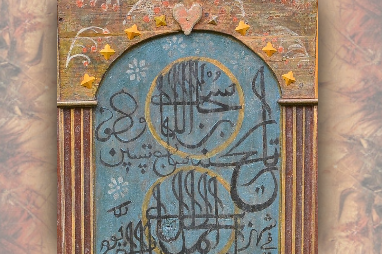Traditional religious culture of the Polish-Lithuanian Tatars. Its unique sources and contemporary fate – film screening and lecture

27 06 2024
The Museum of the Palace of King Jan III in Wilanow and the University of Warsaw would like to invite you to the screening of a documentary film entitled “Traditional Culture of the Polish-Lithuanian Tatars”.
The screening, which will take place on Thursday, June 27, 2024, from 3:00 pm to 5:00 pm, will be accompanied by lectures presenting research on the phenomenon of the culture of this unusual community, which is a piece of the Orient blended into the landscape of the lands of the former Republic of Poland. The lectures will be led by Andrzej Drozd, Ph.D., from the University of Warsaw, together with invited guests.
The presentation will be held in the Sala Uczt of Jan III at the Wilanow Palace. Due to lack of available seats, we invite you to participate online in the event at https://www.akademiawilanowska.pl/
The event presents the unique culture of the Polish-Lithuanian Tatar community shaped in the Polish-Lithuanian Commonwealth since the 14th/15th centuries. Its non-material part, primarily traditional religious rituals, today is in danger of disappearing. The material culture – mosque architecture and historical cemeteries remembering the time of the Battle of Grunwald – is also a unique cultural phenomenon on a global scale. The film and lectures were made possible by recording in traditional Tatar clusters in Poland and Lithuania the last people who have preserved ritual and linguistic forms that have lasted since the Middle Ages, with origins dating back to the Golden Horde and other lands of Turkic peoples.
The Polish-Lithuanian Tatars are a group of indigenous people who have inhabited the eastern lands of the former Polish-Lithuanian Commonwealth since the 14th/15th centuries. The main feature distinguishing the Tatars from the surrounding population is their Muslim religion. In other spheres, the Polish-Lithuanian Tatars underwent far-reaching assimilation and integration into the local environment, including state identification. This group over several centuries developed its own unique culture based primarily precisely on religious elements, characterized on the one hand by adaptation to the conditions of life in a Christian social and cultural environment, and on the other hand by a high degree of permanence in the forms of religious life and attachment to tradition. However, the internal transmission of this culture was very seriously weakened in the post-World War II period as a result of such events as border changes, resettlement, restriction of freedoms and religious life under the communist system, urbanization and the disappearance of traditional rural and small-town communities. A factor that led to the disappearance of the traditional culture of the Polish-Lithuanian Tatars to an even greater extent was the emergence since the 1980s in Poland, and after 1990. also in Lithuania and Belarus, the education of children and young people based on teachers and educational materials from Middle Eastern countries, leading to the displacement of the traditional cultural identity of indigenous Muslim communities in south-central and eastern Europe, the Caucasus and Central Asia (in the territories of former Yugoslavia and the former USSR) and replacing it with an identity based on the ideology of these communities. At the present time, the traditional religious culture of the Polish-Lithuanian Tatars is in its final stage of disappearance. It is mainly based on the few representatives of the oldest generation, raised in the interwar period, who are still alive. Stopping this disappearance is therefore only possible within the next few years. Otherwise, the Polish-Lithuanian Tatars’ own historical religious culture will be irreversibly lost by them.
(based on https://www.wilanow-palac.pl/)
(The photograph illustrating the information is from the collection of Andrzej Drozd, Ph.D.)